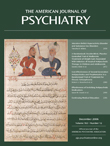To the Editor: In a recent article, Kenneth S. Kendler, M.D.
(1) expressed strong skepticism that molecular genetic research would ever lead to major breakthroughs in psychiatric nosology. We are in agreement with him in many respects. Our impression, however, is that he throws out the baby with the bath water, and we feel this deserves comment.
Molecular genetics will identify the genes involved in the etiology of psychiatric disorders. What has until now been a slow process for complex disorders will, in the future, lead to a flood of findings. It will ultimately be possible to connect every genetic contribution, irrespective of which functional effect it mediates, with variations in deoxyribonucleic acid (DNA) sequence, which may be anything from small changes, such as replacement of a single base, to a variation in blocks of thousands of bases, as in the case of the recently highlighted copy number variants. The certainty that genetic contribution resides somewhere in the DNA is something that will not be challenged by discussions about the nature of a gene.
The fact that, so far, identified susceptibility alleles do not have a high odds ratio is unsurprising. A very wide range exists between the 100% expression of the genes of monogenic disorders and that of genes carrying a very small risk for the development of a disorder. The susceptibility genes identified so far have been found in relatively heterogeneous cohorts. It is likely, however, that the genes carrying a high risk will only be found in very homogenous cohorts, and, at present, it remains unclear which features of the phenotype should be used to select such subgroups. Increasingly refined phenotyping and use of more homogenous cohorts will address this issue. A further plausible scenario likely to lead to higher odds ratios is the presence of gene-gene interactions, even where little or no marginal effect is conferred by the individual loci. Although difficult, it has been suggested that these interactions will be detectable through the examination of large cohorts, including research contexts where hundreds of thousands of markers are tested, such as in genome wide association studies
(2) .
Understanding of disease etiology will benefit enormously from the identification of disease susceptibility genes and the interactions between such genes and between genes and environment. Knowledge of disease etiology will in turn facilitate the development of new, rationally based medications and will also increase our understanding of the course of disorders. Although this state of affairs remains a long way off, it is unrealistic to imagine that such an increase in the understanding of disease etiology will not influence nosology, even though nosology is complex, involving a number of factors such as sociological and economic ones. The fact that we stand at the beginning of development in this field should not be construed as grounds for skepticism.

